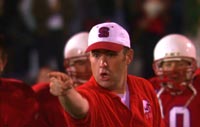Many sports movies are formulaic and predictable, meant to be shots of adrenaline for rousing moviegoers, bringing them to their feet, and sending them out of the theater inspired and uplifted. Occasionally, a sports movie rises above the formula, engaging the intellect with superb characterization, acting, and story—a la Raging Bull, Field of Dreams, and Hoosiers. But often, if the on-field action is gritty and exciting enough, all it takes is a few motivational speeches and an against-the-odds underdog story, and you’ve pretty much got a winner.
Well, usually, anyway. Facing the Giants, the latest inspirationalfootball story to hit the big screen, tests the limits of this theory. When the players are on the field and the football is in the air, it’s a surefire audience pleaser; when the action cools down and we’re left with just the characters and the story, the fumbles start adding up awfully fast.

A variation on the standard football movie plot, Facing the Giants takes place in a southern Christian high school, where coach Grant Taylor (Alex Kendrick, who also wrote and directed the film) is struggling to keep the school’s football program alive. The team isn’t winning, the players are apathetic, and some of the parents are trying to have Grant replaced. When we first see him go home to his wife, Brooke (Shannen Fields), we learn that Grant’s also having problems off the field; in fact, the film begins stacking the odds so high against Grant that it flirts with outright melodrama—his car won’t start, his home is in a state of disrepair, he and Brooke can’t conceive, money is running out, and most folks just plain don’t like him.
Then, just when things seem like they can’t get any worse, a stranger shows up in Grant’s office and shares a Scripture verse, saying that the Lord sent him there. Suddenly, it’s a whole new ballgame! Grant prays, gets inspired, and revamps his entire philosophy of coaching. His enthusiasm spreads to the whole team, and then the whole school, and suddenly, as Grant notes, it’s “like a whole new team.”

The motivational speeches are all here, but there’s not much in the way of an emotional payoff. For one thing, the odds are stacked so high against Grant and his team that it begins to feel contrived and clichéd—for example, a new kicker joins the team thanks to the prodding of his wheelchair-bound father, and, even though he can’t play worth anything, the coaches have a good feeling about him, and let him play anyway.
Then, the film glosses over Grant’s change of heart—we briefly see him slip into despair, then, after a short sequence of walking in the woods and reading his Bible, he’s suddenly a whole different person, all in a matter of minutes. One might not be looking for deep psychological drama here, but this transformation just feels cheap and tawdry.
And then there’s the theology. An assistant coach twists Jesus’ words about the wide and narrow gates to apply to kicking field goals. And despite writer/director Kendrick’s insistence that he’s “not a name-it-and-claim-it guy,” that’s just what happens in the movie: After Grant gets right with Jesus, everything goes his way. We won’t give away the plot developments, but suffice it to say that every situation that could go either way ends up going the “right” way—on and off the field. The “giants” aren’t merely faced; they’re all slain, and everybody lives happily ever after. Seems a bit like “prosperity gospel” dressed up in helmets and shoulder pads.

The acting is just as bad. Kendrick is at times as wooden as one of George Lucas’ actors, at other times so melodramatic that he actually reminds one of Will Ferrell—only, he’s not trying to be funny. Fields also turns in a performance that somehow manages to be exaggerated and flat at the same time, and most of the grown-up supporting cast members are no better. The younger actors who play the team members give some of the most convincing performances, which helps to highlight the movie’s strongest feature—when the cheesy dialogue and story shut down and the football kicks in, there’s a surprisingly well-done sense of realism here, as the film does an admirable job of capturing the atmosphere of a high school football game.
One must also acknowledge that the film—made on a $100,000 budget by a Baptist church in Albany, Georgia—has its heart in the right place; there are good lessons here about honoring God in everything that we do, the importance of respect and leadership, and the power of prayer. Those are all things viewers could benefit from hearing. Whether they ever will hear them, though, is another matter—when a film is as unintentionally corny as this one, it’s anyone’s guess as to how many viewers can stomach all the schmaltz for the positive message at the end.
Talk About It
Discussion starters- What do you think causes Grant’s change of heart midway through the movie
- What does the film tell us about winning? About doing our best in everything we do
- What lessons does the film show us about respect
- According to the film, what are some qualities of a good leader
- Seems like everything went right for Grant and those around him after he got right with Jesus. Does that seem realistic? Why or why not? How might you have written the story differently?
The Family Corner
For parents to considerFacing the Giants is rated PG for some thematic material. Aside from some talk about a married couple trying to conceive, and perhaps some hard-hitting football action, there’s nothing here that should be too concerning for parents—though you may want to talk with your kids about some of the iffy theology presented in a few scenes (see especially Question 5 in “Talk About It” above).
Photos © Copyright Samuel Goldwyn
Copyright © 2006 Christianity Today. Click for reprint information.
What Other Critics Are Saying
compiled by Jeffrey Overstreetfrom Film Forum, 10/05/06Film critics sometimes face daunting challenges—especially when their responsibility to assess a film’s strengths, weaknesses, and artistic integrity ends up offending moviegoers who were inspired by a particular movie.
Such was the case recently for Christian film critics who saw Facing the Giants. Several factors contributed to this:
1) The film had already been in the national news when the MPAA gave Giants a PG rating instead of a G. Initial reports claimed that the MPAA cited the film’s proselytizing as the reason, but the MPAA soon said it was for other “thematic” reasons.
2) Giants is one of those rare films in which Christian faith is presented as a positive thing—a rare treat for Christians who get tired of seeing themselves portrayed as buffoons or villains.
3) The journey of making Giants—by a Baptist church in Georgia—is an inspiring tale. Giants was funded by Christians, put together by volunteers, and looks impressive considering its low budget.
4) Giants follows in a long line of sports-related films that inspire audiences with a David-and-Goliath story; audiences love a tale of underdogs who overcome the odds.
Thus, any critic who, in assessing its technical and artistic excellence, dares to point out Giants’ weaknesses along with its strengths is bound to upset people who think that Christian content alone is sufficient to make it a good movie.
But the critic’s job is not to judge the film based on whether or not the audience will cheer. Nor should he base his assessment on whether or not the film preaches a Christian message. The critic is responsible to consider how the film is made, and assess whether it is sloppy, mediocre, adequate, admirable, or—and this doesn’t happen very often—excellent. He must consider the quality of the performances, editing, soundtrack, cinematography, screenwriting, direction, and more. He must hold it up to other films of its kind, to see how its artistry compares to others. In short, he must consider not only what story the movie tells, but also whether or not it tells that story in the best possible way.
David DiCerto (Catholic News Service) says, “The narrative uses a standard underdog formula. As if the David-versus-Goliath analogy isn’t clear enough, the team’s undersized placekicker is named David. … [W]hile the movie’s heart is in the right place, its positive theme about trusting in God is handicapped by a prosaic script … that tends toward the preachy.”
Sister Rose Pacatte (St. Anthony Messenger) is more blunt: “This rather simplistic, stilted and somewhat boring film is more of a sermon than a movie that inspires. … The producers went for evangelical-style drama, but it could have used some creative subtlety and originality.”
Steven D. Greydanus (Decent Films), who sometimes writes for CT Movies, had a mixed reaction. He says the film “pulls off the potentially problematic combination of religious and athletic inspiration more often than not—at least on the field. … [T]he film finds some clever ways to connect faith and success without reducing belief to a lucky feather or God to a team mascot.”
But Greydanus also writes, “Unfortunately, the filmmakers haven’t figured out how to realize the critical spiritual turning points off the field … . These moments of conversion are plot points that just happen, with no sense of character development or insight.”
Hannah Goldwyn (CBN) says, “Audiences will see a real life testimony of God’s power and mercy in Facing the Giants. It has a lesson for everyone to learn from trusting God when you feel like your situation is hopeless to honoring your parents.” But she criticizes some of the screenwriting and adds, “Some things could have been better: the beginning and the acting. The first part of the movie is a little slow, but that’s soon forgotten as the story starts to pick up a third of the way in. Also, the lack of acting talent is vaguely evident and the story is predictable at times.”
Phil Boatwright (Baptist Press) says the movie “had the usual cinematic shortcomings associated with well-meaning Christian moviemaking. During the opening sequences, both the actors and dialogue seem clumsy and forced. But as the film continues, something so sincere about the cast overshadows the handicaps of their amateur status.”
Tom Neven and Steven Isaac (Plugged In) say we should be cheering the film because of its volunteer efforts and the Christian message. “[B]y embracing the spiritual concept of faith and then exploring the tension that exists between human experiences and spiritual realities, this little film that could—does. … These amateurs make it look easy. And they make it look good. Maybe that’s because they took the film’s earnest message to heart: Win or lose, they trusted God and gave Him their very best.”
Christa Banister (Crosswalk) says “the screenwriter creates memorable, relatable characters and does an exceptional job of talking about faith in the face of fear without crossing the line into blatant proselytizing.”
All in all, then, some mixed reactions from Christian critics. But among mainstream reviewers, only 17 percent are giving it a good review. Art has the power to inspire and challenge in ways that direct preaching and evangelizing does not, but Giants apparently didn’t accomplish that with mainstream critics.
“If there were an Oscar category for ultralow-budget movies with all-volunteer casts produced, written and directed by unknown pastors, Facing the Giants would handily be nominated,” writes William Lobdell (Los Angeles Times). “But stacked against its competition in theaters, Facing the Giants feels like an overly earnest church sketch of the type many evangelical congregations use as a teaching tool on Sunday between the worship music and pastor’s message.”
Sean Axmaker (Seattle Post-Intelligencer) writes, “[L]ike too many films of faith, it mixes its message, proclaiming that a life given over to God is a reward unto itself, and then handing over victories to its faithful like some overtime bonus.”
Jeff Strickler (Minneapolis Star-Tribune) says, “The religious proselytizing in this football movie is about as subtle as a blindside hit by a 300-pound defensive end.”
Chris Hewitt (St. Paul Pioneer Press) asks, “If the Christian football team in Facing the Giants begins to win because God wants them to, does it follow that the acting isn’t good because God didn’t want it to be?”
So, to sum up: Are audiences loving it? Yes. Does it have a positive Christian message? Obviously. Is it crafted with more professionalism and quality than most “Christian films”? Yes. But are there some valid criticisms? Many accomplished critics think so, in the religious press and in the mainstream press. And since we serve a God who cares about excellence as well as “messages” and crowdpleasing, we should be glad that there are watchful critics challenging us to strive for better and better things.
Film Forum will post links to further reviews as they become available.











